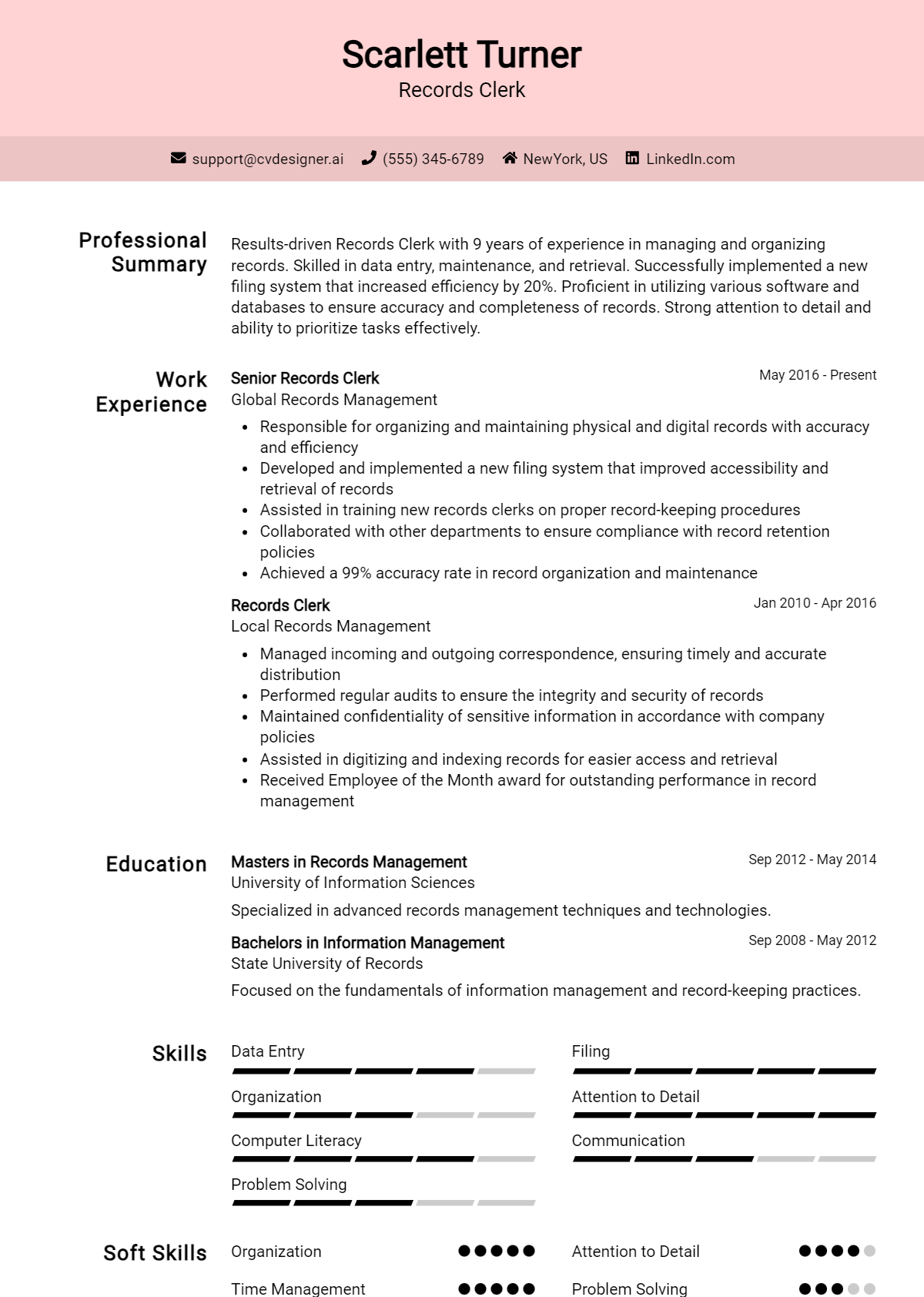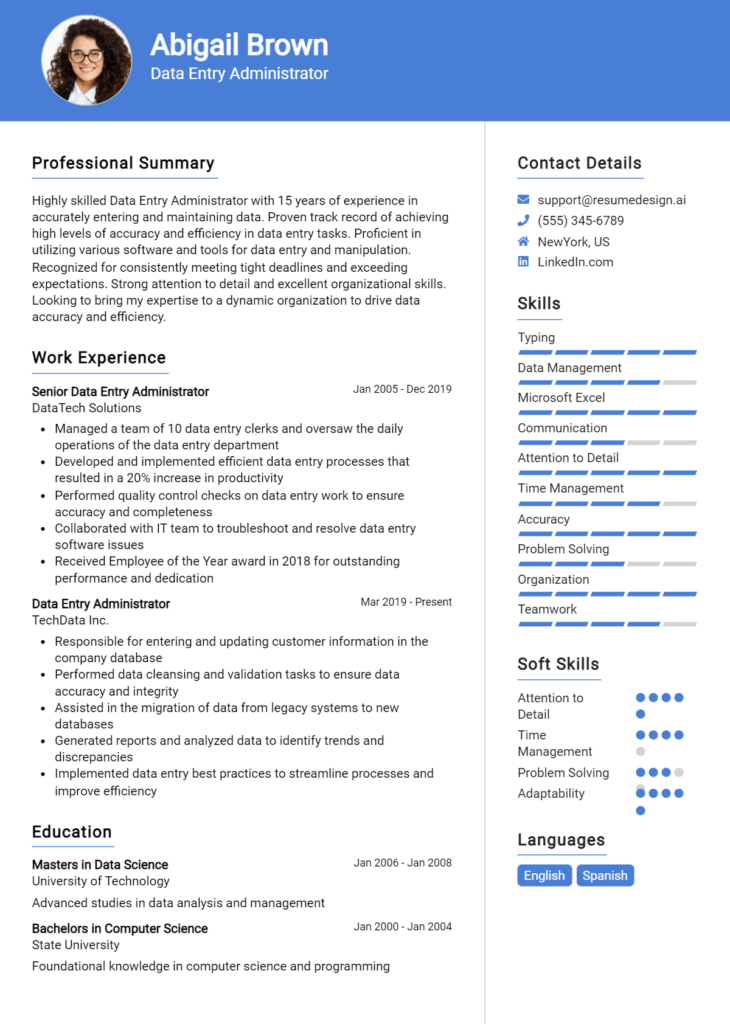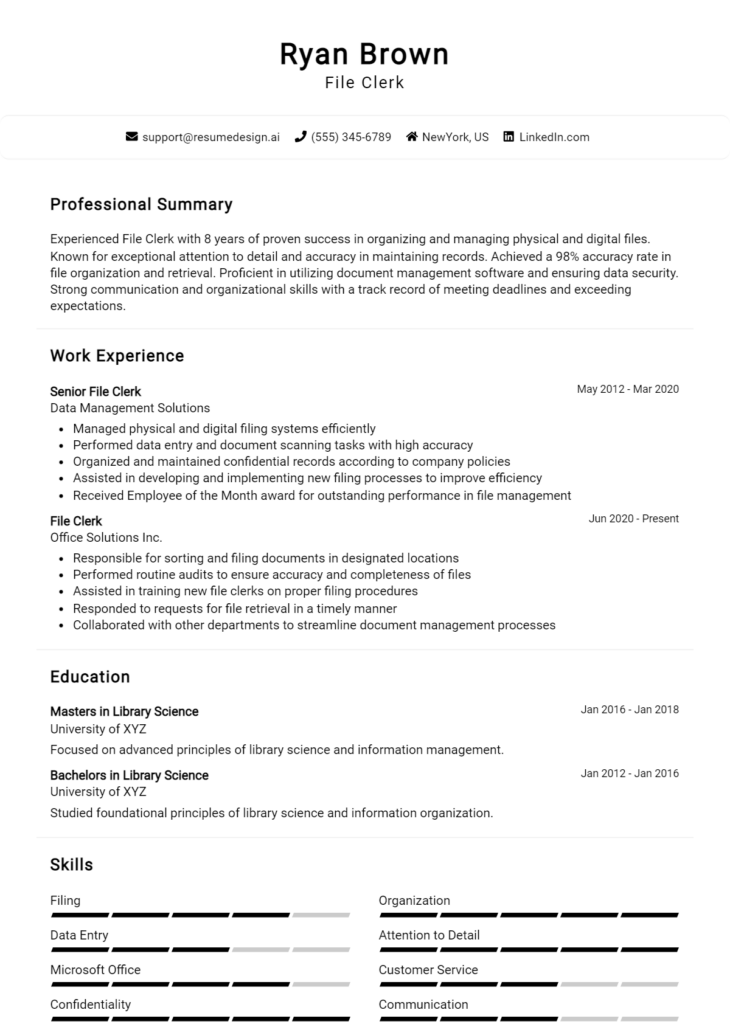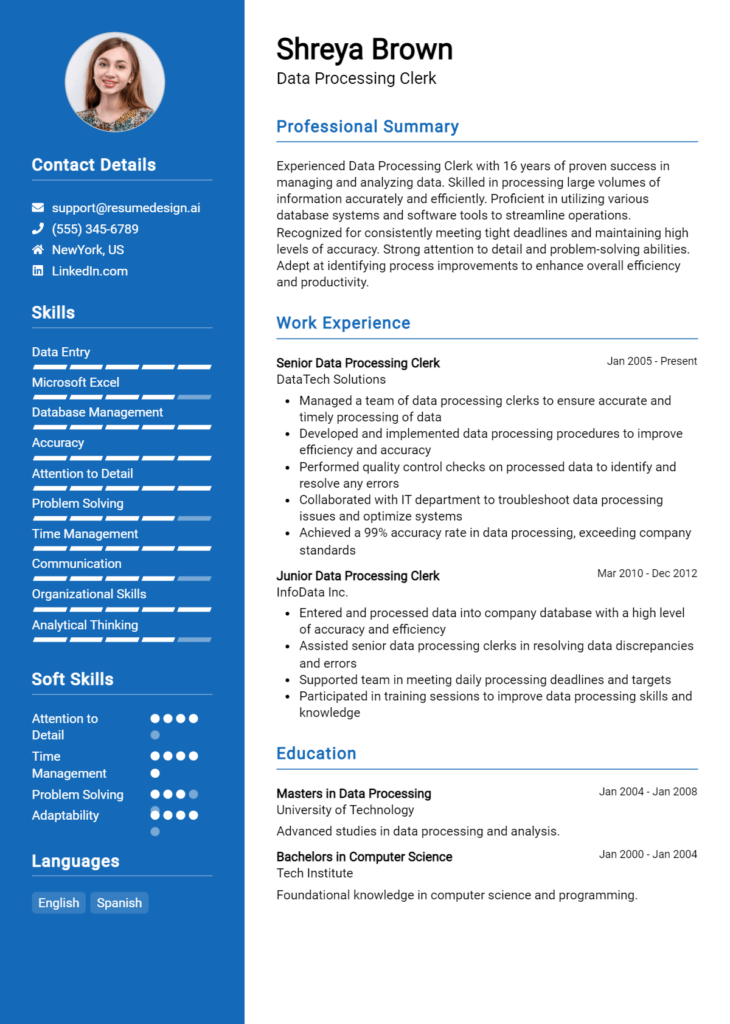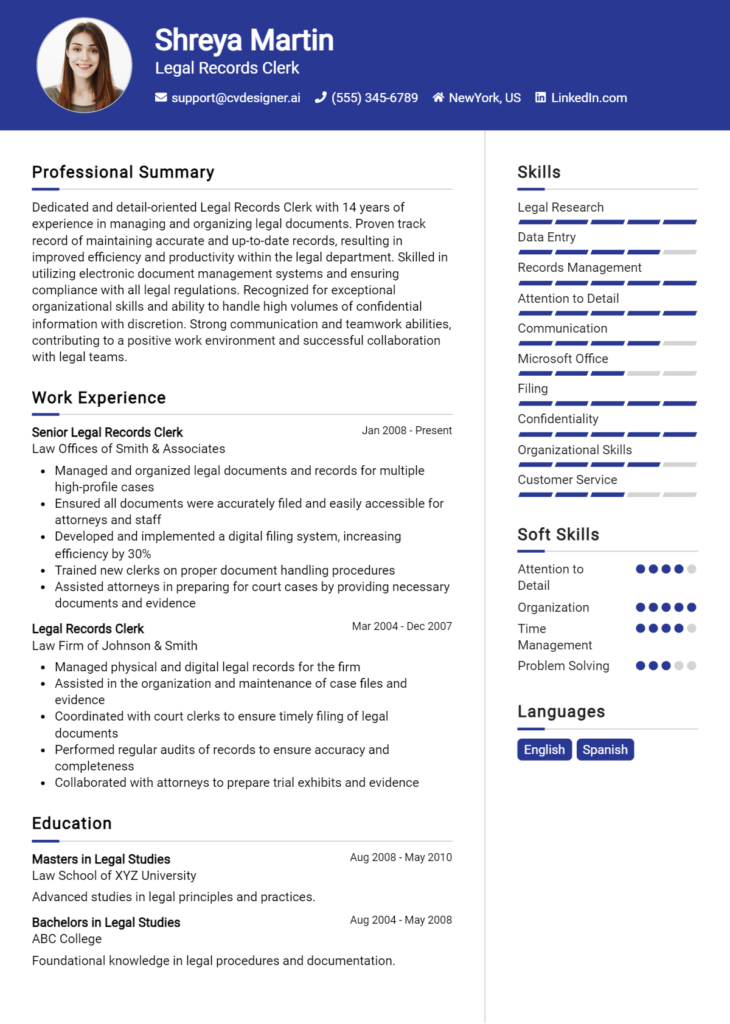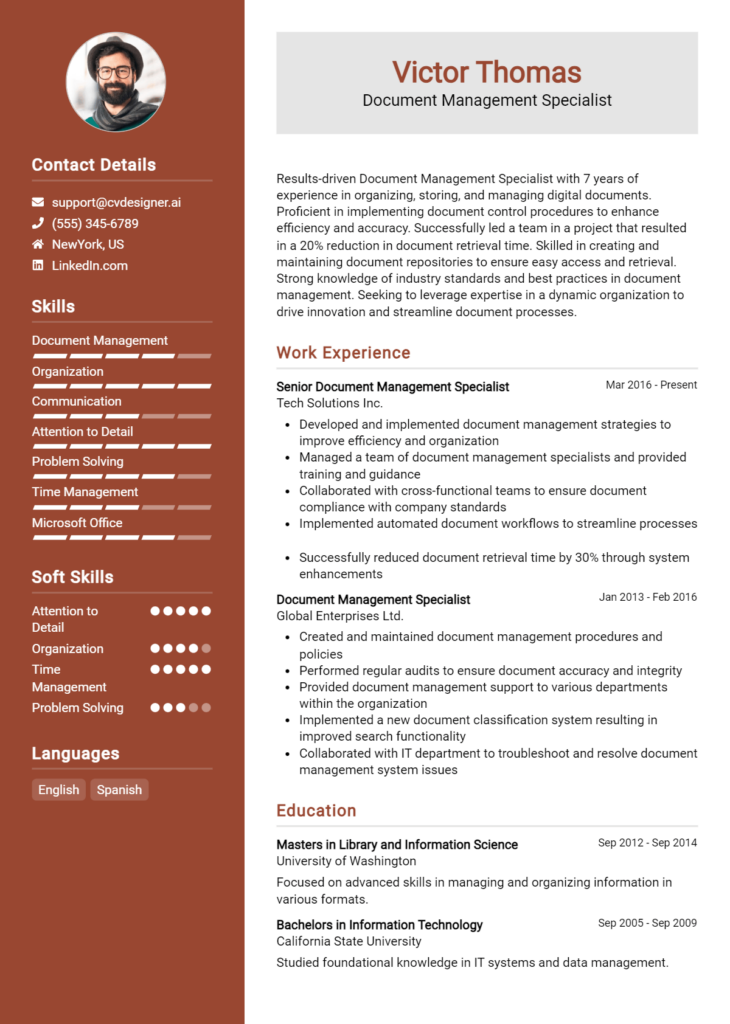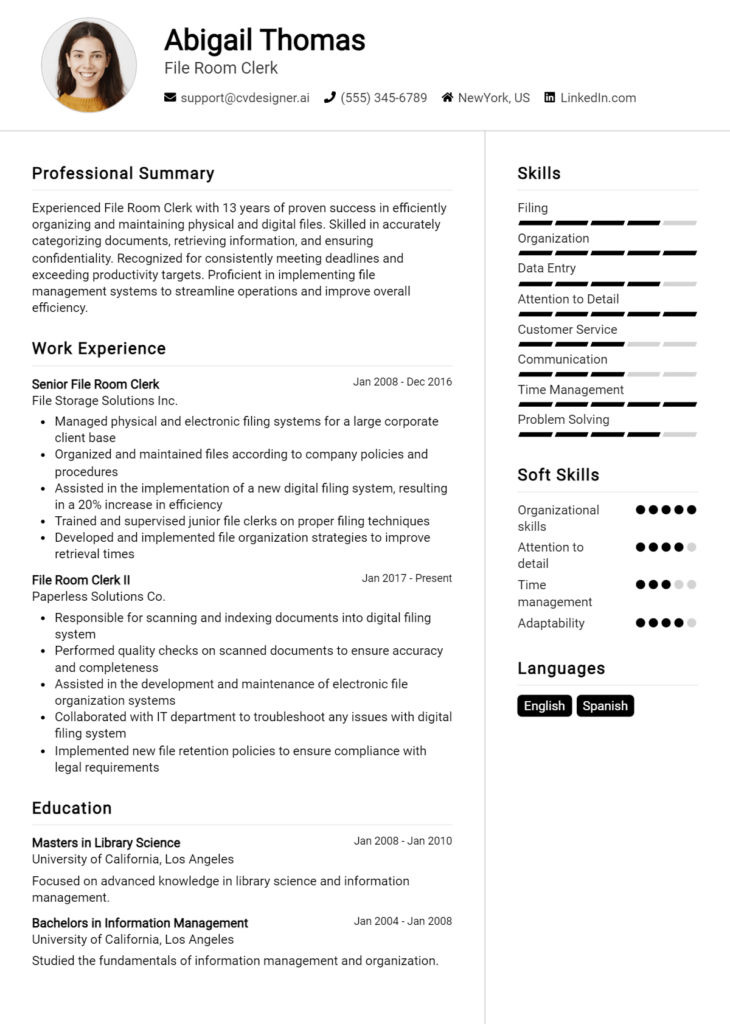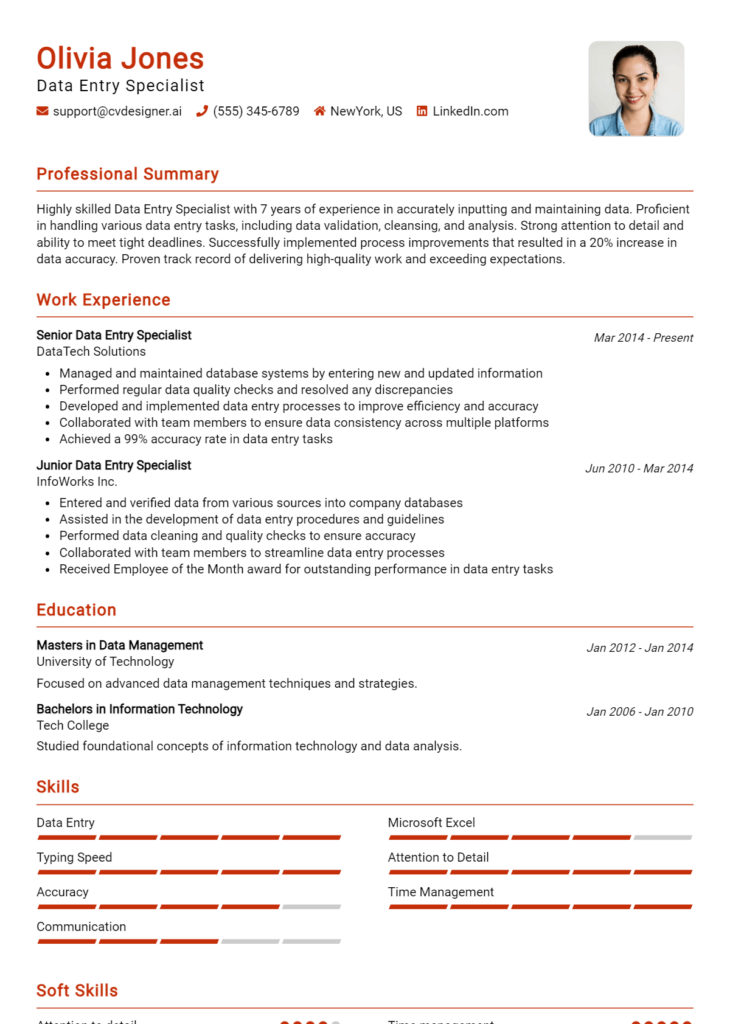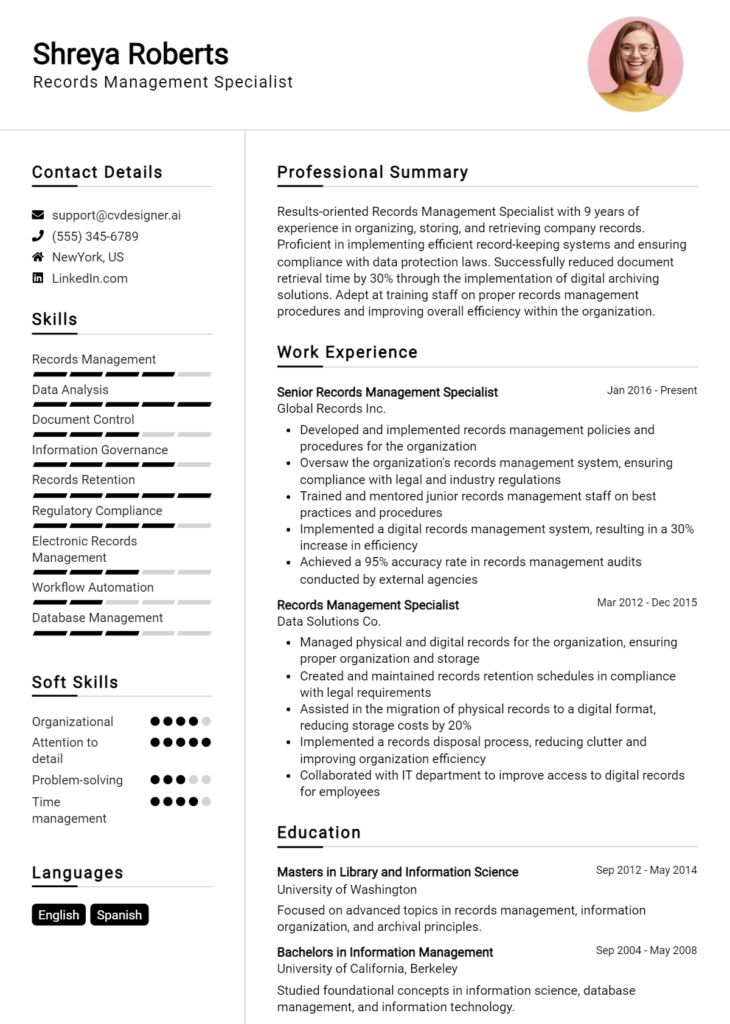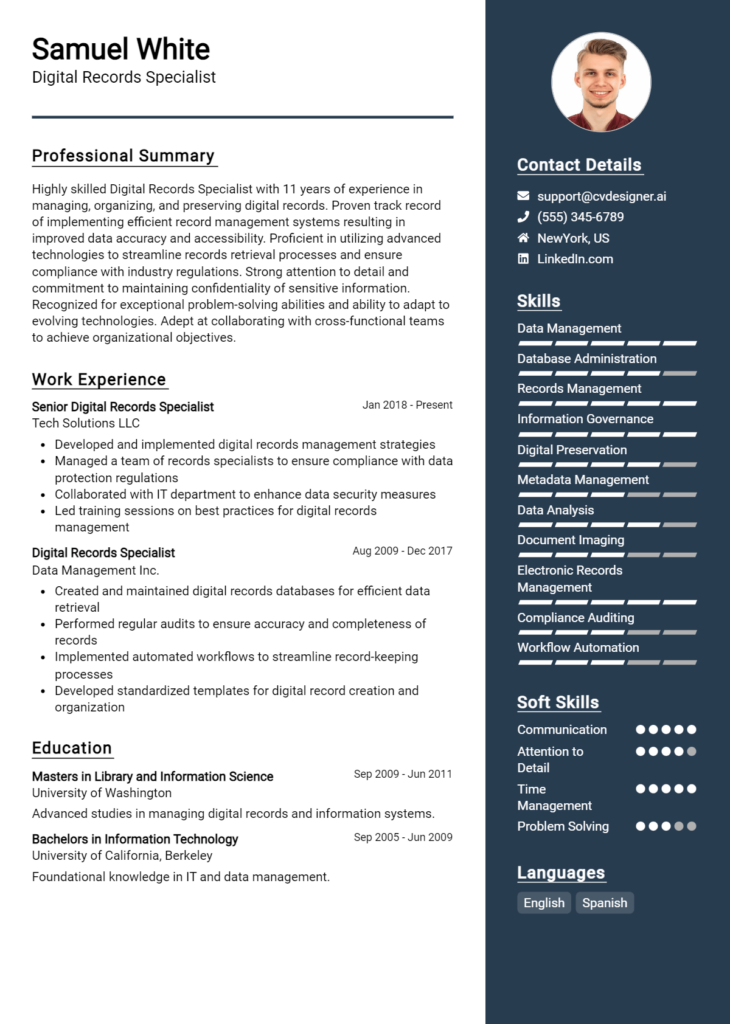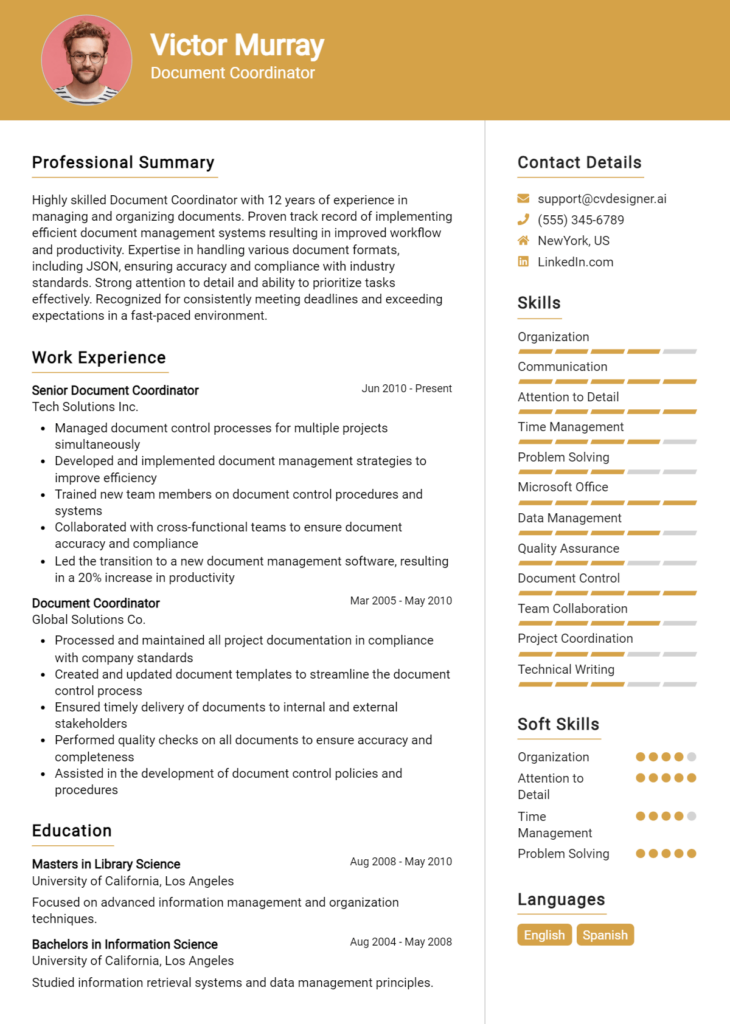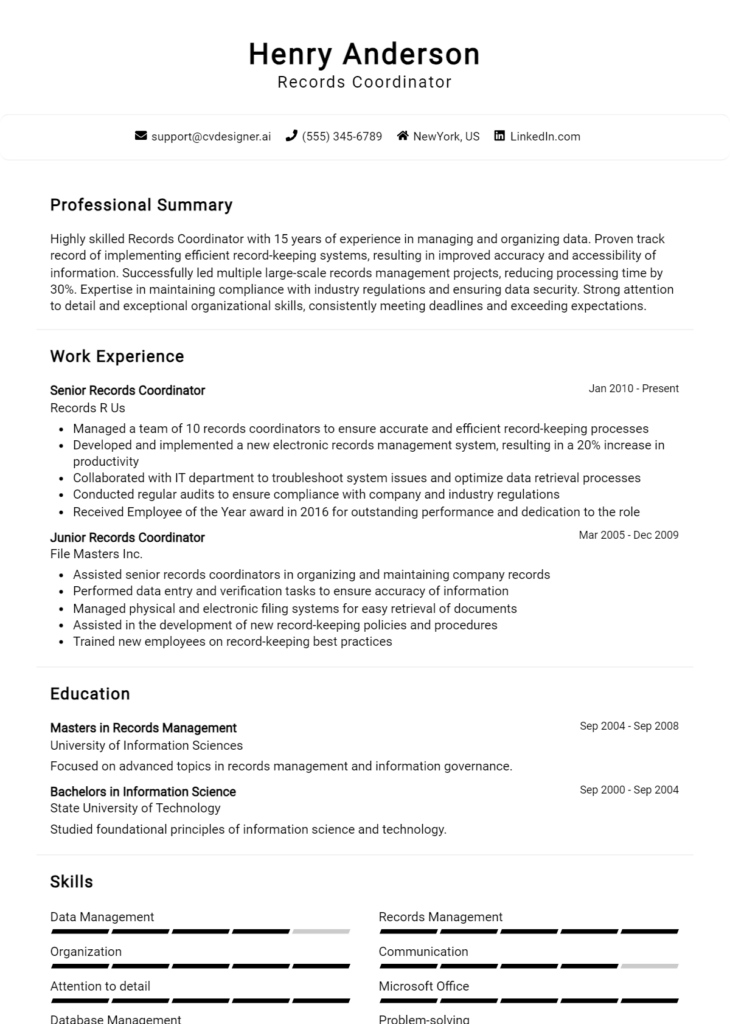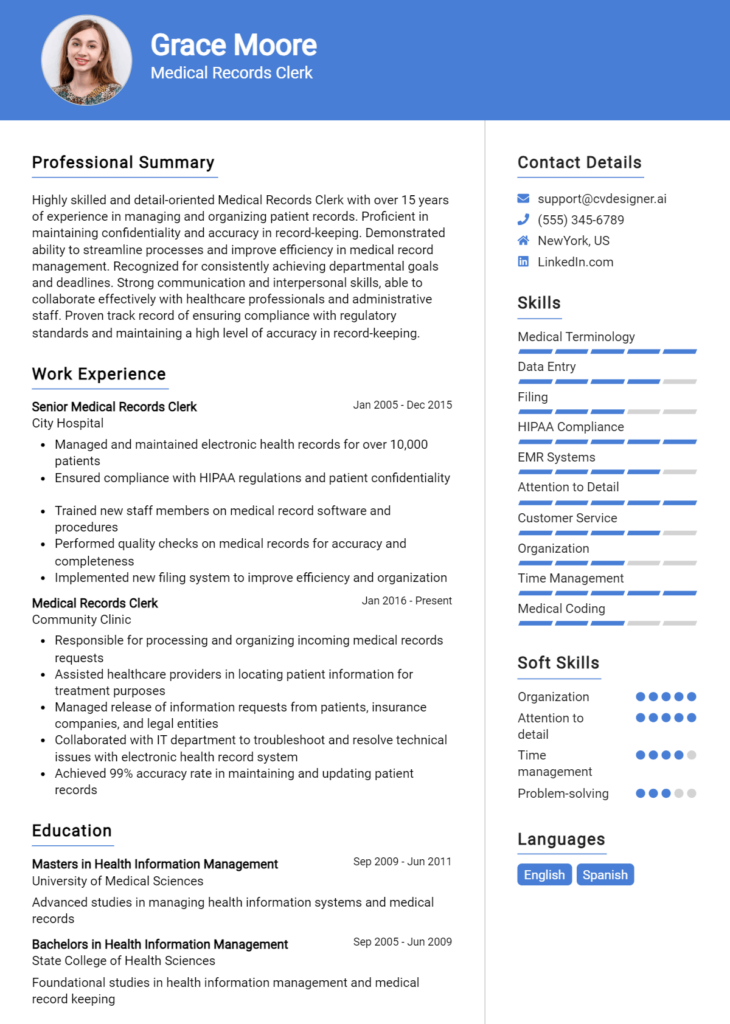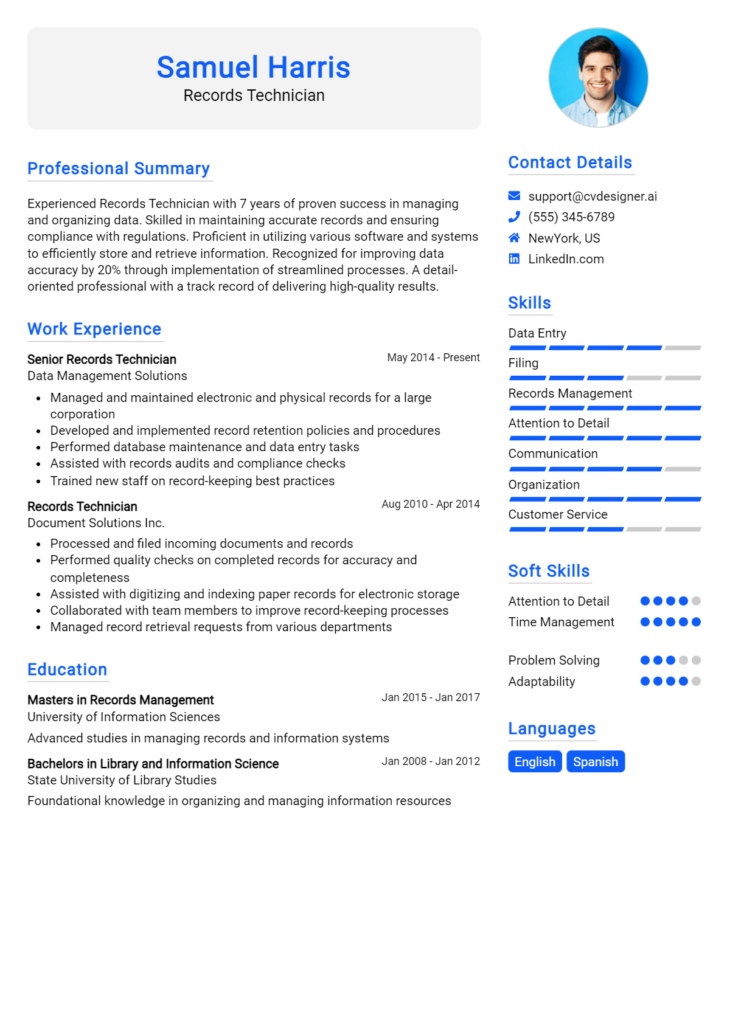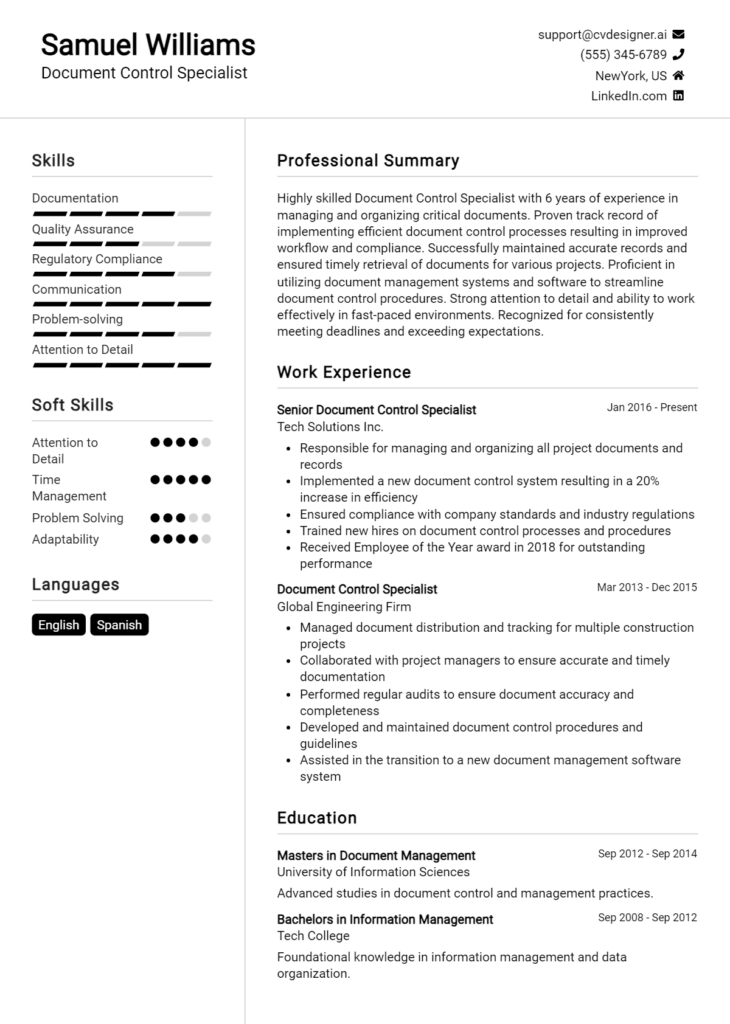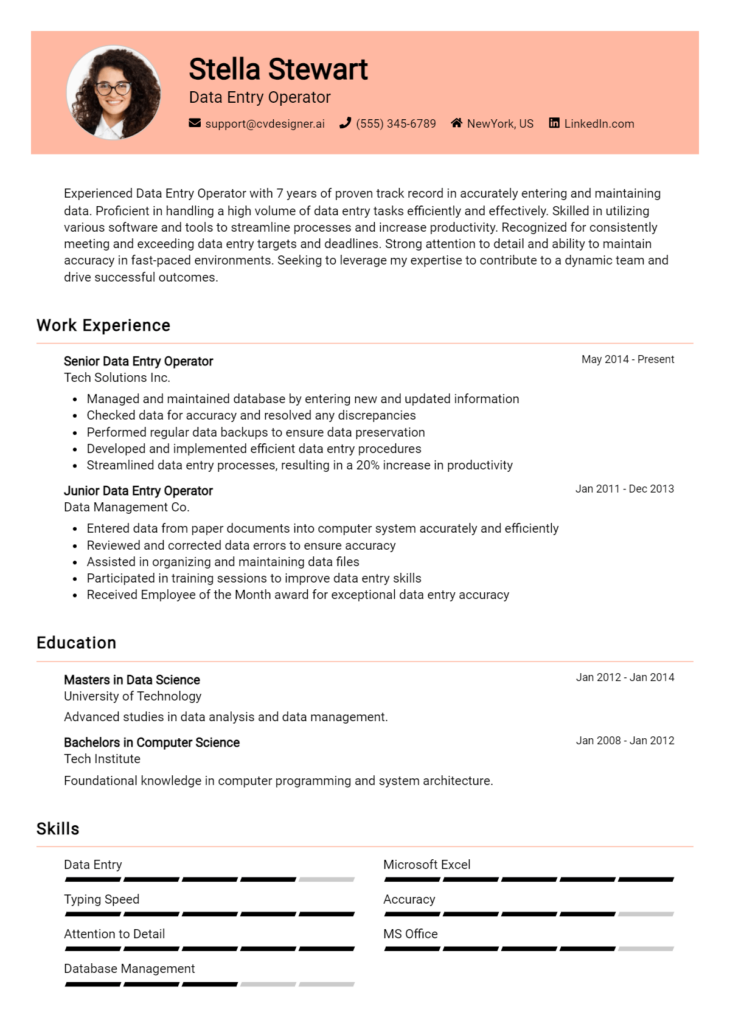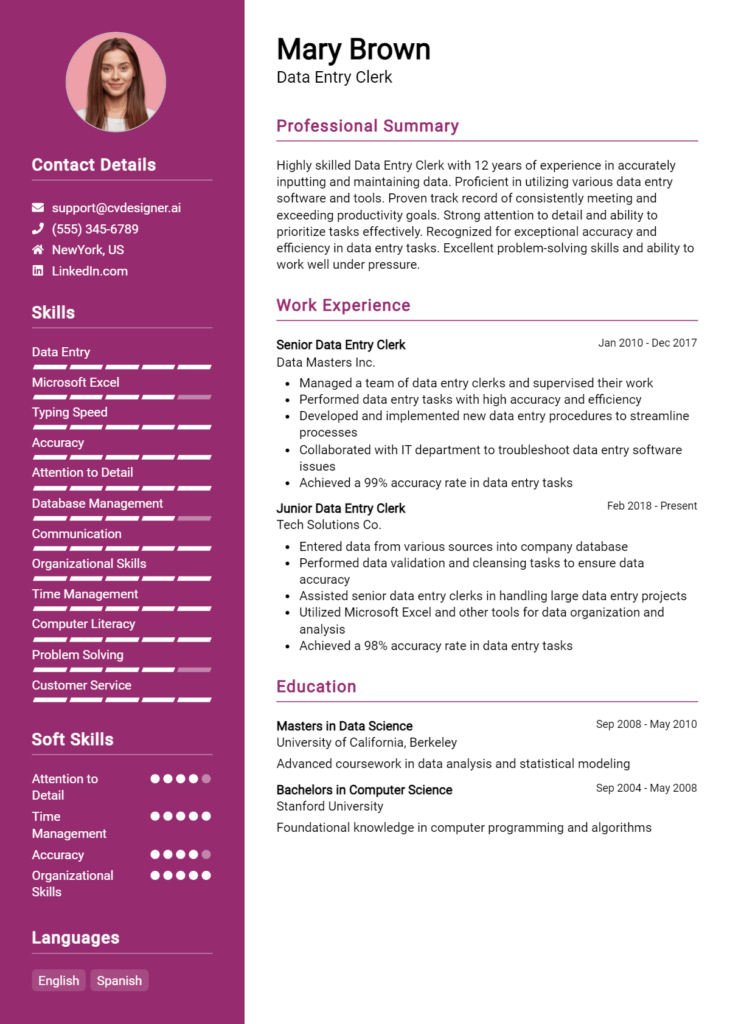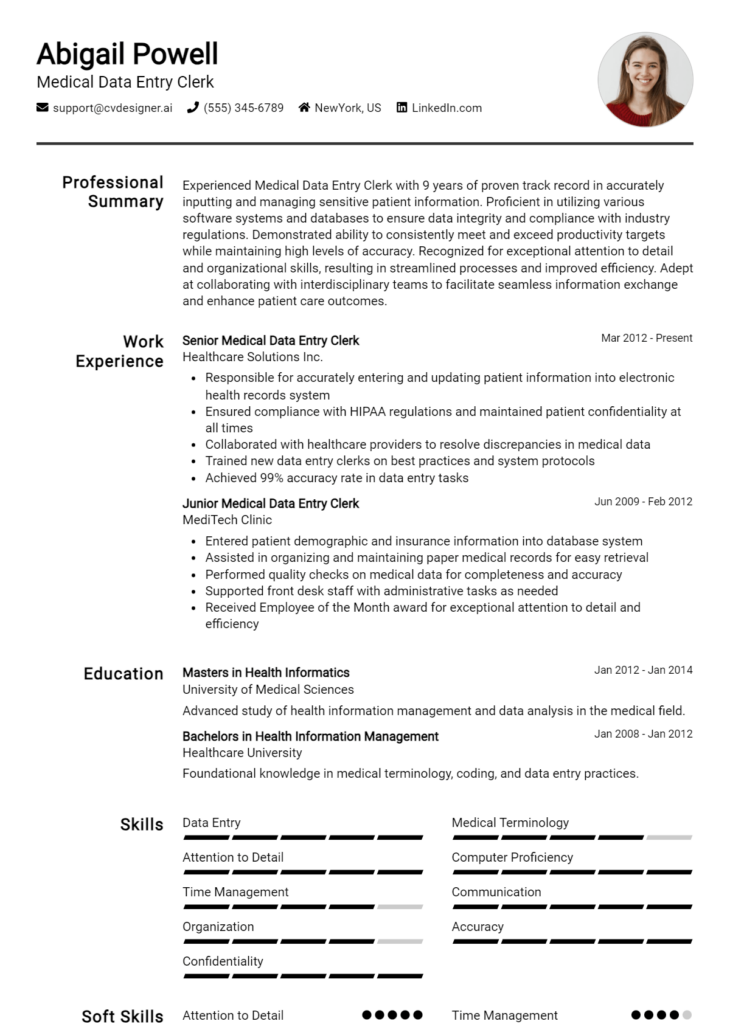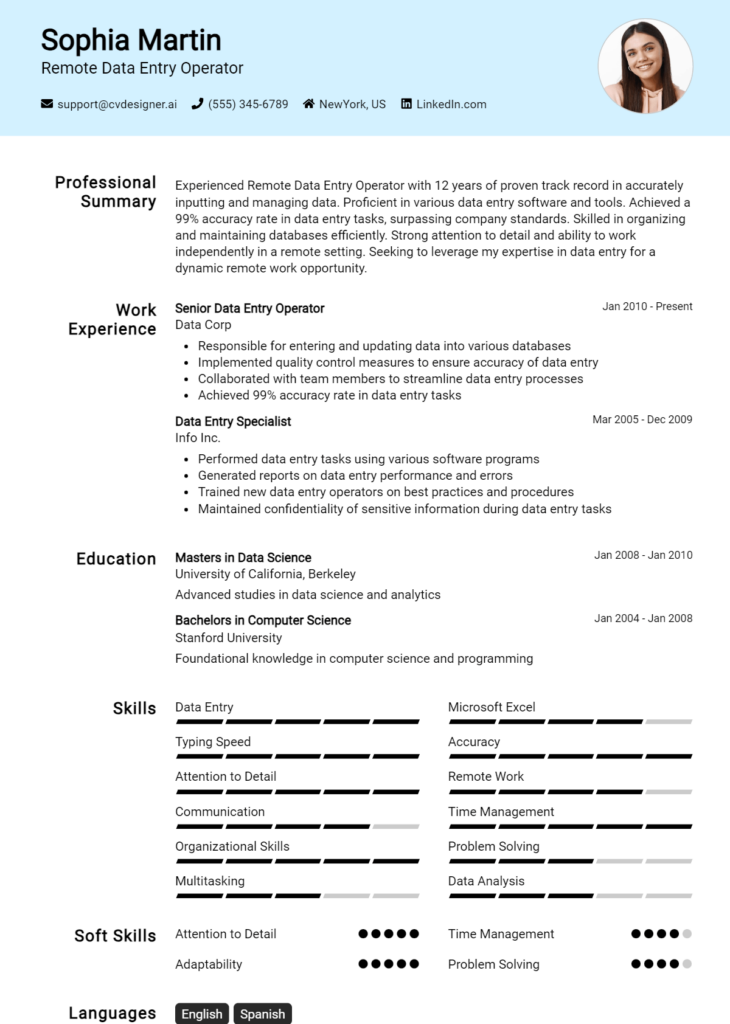Records Clerk Core Responsibilities
A Records Clerk plays a crucial role in managing and maintaining accurate records across various departments, ensuring operational efficiency and compliance. Key responsibilities include organizing files, data entry, and retrieval, along with assisting in audits and reporting. Strong technical skills in database management, operational awareness, and problem-solving abilities are essential for success in this role. These competencies contribute significantly to the organization's overall goals by facilitating seamless information flow. A well-structured resume can effectively highlight these qualifications, making candidates stand out.
Common Responsibilities Listed on Records Clerk Resume
- Maintain and organize physical and digital records.
- Perform data entry and update records as necessary.
- Assist in audits by providing necessary documentation.
- Respond to record requests from internal and external stakeholders.
- Ensure compliance with data protection regulations.
- Implement and follow filing systems for efficient retrieval.
- Train staff on record-keeping procedures and systems.
- Conduct regular reviews to ensure accuracy of records.
- Prepare reports based on record analysis.
- Collaborate with various departments to streamline information flow.
- Handle confidential information with discretion and integrity.
- Utilize software applications for record management and tracking.
High-Level Resume Tips for Records Clerk Professionals
In today's competitive job market, a well-crafted resume is essential for Records Clerk professionals looking to make a strong first impression on potential employers. Your resume serves as a critical introduction, showcasing not only your skills and qualifications but also your achievements in managing and organizing records efficiently. A polished resume can set you apart from other candidates, emphasizing your attention to detail and commitment to maintaining accurate records. This guide aims to provide practical and actionable tips specifically tailored for Records Clerk professionals, helping you create a resume that reflects your expertise and enhances your candidacy.
Top Resume Tips for Records Clerk Professionals
- Tailor your resume to match the specific job description, using keywords that highlight required skills and responsibilities.
- Showcase relevant experience by including past roles that involved record management, data entry, or administrative support.
- Quantify your achievements with metrics, such as the number of records managed or improvements in filing efficiency.
- Highlight industry-specific skills, such as knowledge of recordkeeping software, compliance regulations, and data protection protocols.
- Include certifications or training related to records management, such as courses in data entry or document control.
- Use a clean, professional format that is easy to read, ensuring that key information stands out.
- Incorporate strong action verbs to describe your responsibilities and accomplishments, making your contributions clear and impactful.
- Keep your resume concise and focused, ideally within one to two pages, to maintain the reader's attention.
- Proofread your resume meticulously to avoid any errors, as attention to detail is critical in the Records Clerk role.
By implementing these tips, you can significantly enhance your resume, increasing your chances of landing a job in the Records Clerk field. A well-structured and tailored resume not only highlights your qualifications but also demonstrates your dedication to excellence in record management, making you a compelling candidate for potential employers.
Why Resume Headlines & Titles are Important for Records Clerk
In the role of a Records Clerk, the importance of a well-crafted resume headline or title cannot be overstated. This concise phrase serves as the first impression for hiring managers, instantly summarizing a candidate's key qualifications and making a compelling case for their fit for the job. A strong headline captures attention and provides a snapshot of relevant skills and experiences, setting the tone for the rest of the resume. It is essential that the headline is concise, relevant, and directly related to the position being applied for to maximize its impact.
Best Practices for Crafting Resume Headlines for Records Clerk
- Keep it concise—aim for one impactful sentence or phrase.
- Use role-specific language that aligns with the job description.
- Highlight key skills or qualifications prominently.
- Incorporate relevant certifications or years of experience.
- Avoid vague terms; be specific about your expertise.
- Use action verbs to convey your capabilities dynamically.
- Tailor the headline for each application to reflect the specific role.
- Consider including quantifiable achievements for added impact.
Example Resume Headlines for Records Clerk
Strong Resume Headlines
Detail-Oriented Records Clerk with 5+ Years of Experience in Data Management
Efficient Records Clerk Specializing in Document Organization and Compliance
Dedicated Records Clerk with Proven Track Record in Streamlining Filing Systems
Skilled Records Clerk with Expertise in Electronic Records Management Systems
Weak Resume Headlines
Records Clerk Seeking Job
Hardworking Individual Ready to Work
Professional with Experience in Office Work
Strong resume headlines are effective because they are specific, directly related to the role of a Records Clerk, and highlight the candidate's unique strengths and experiences. They immediately convey relevant qualifications that can resonate with hiring managers, making a candidate stand out. Conversely, weak headlines fail to impress due to their vagueness and lack of specificity, leaving hiring managers uncertain about the candidate's true qualifications and fit for the role.
Writing an Exceptional Records Clerk Resume Summary
A resume summary is a critical component of a Records Clerk's application, as it serves as the first impression for hiring managers. A well-crafted summary can quickly capture attention by highlighting key skills, relevant experience, and notable accomplishments that align with the job role. This brief yet impactful section should be concise and tailored specifically to the job description to effectively showcase how the candidate is an ideal fit for the position.
Best Practices for Writing a Records Clerk Resume Summary
- Quantify achievements where possible to demonstrate impact and effectiveness.
- Focus on relevant skills such as data entry, record management, and attention to detail.
- Tailor the summary to the specific job description to highlight alignment with the employer's needs.
- Use action verbs to convey a sense of proactivity and professionalism.
- Keep it concise, ideally within 2-4 sentences, to ensure clarity and ease of reading.
- Incorporate industry-specific terminology to demonstrate familiarity with the field.
- Highlight any certifications or training relevant to records management.
- Showcase soft skills such as organization, communication, and problem-solving abilities.
Example Records Clerk Resume Summaries
Strong Resume Summaries
Detail-oriented Records Clerk with over 5 years of experience in managing electronic and physical records for a busy healthcare facility. Successfully reduced record retrieval times by 30% by implementing an efficient filing system.
Dedicated Records Clerk with expertise in data entry and document management, maintaining a 99% accuracy rate in record keeping. Proven track record of optimizing processes, resulting in a 20% increase in operational efficiency.
Results-driven Records Clerk with a strong background in compliance and data protection. Achieved a 25% reduction in document processing time through the introduction of automated tracking systems.
Weak Resume Summaries
Experienced clerk looking for a job in record management. I have good organizational skills and some experience.
Records Clerk with knowledge of data entry and filing systems. I want to contribute to a team and improve my skills.
The examples of strong resume summaries are effective because they include quantifiable results, specific skills, and direct relevance to the role of a Records Clerk. They clearly communicate the candidate's accomplishments and how they can add value to a potential employer. In contrast, the weak summaries lack detail and clarity, providing vague descriptions that do not effectively showcase the candidate's qualifications or potential contributions to the organization.
Work Experience Section for Records Clerk Resume
The work experience section of a Records Clerk resume is crucial for demonstrating the candidate's relevant technical skills and their capability to manage tasks effectively while delivering high-quality results. This section serves as a platform to showcase how past roles have equipped the candidate with the expertise needed to handle records management, data entry, and compliance with industry standards. By quantifying achievements and aligning experiences with established benchmarks, candidates can effectively illustrate their value to potential employers.
Best Practices for Records Clerk Work Experience
- Use action verbs to describe responsibilities and achievements clearly.
- Quantify results wherever possible, such as tracking the number of records processed or accuracy rates.
- Highlight technical skills like database management, document scanning, and records retention systems.
- Showcase collaboration by mentioning teamwork on projects or cross-departmental communication.
- Align experiences with industry standards and best practices in records management.
- Include specific software or tools used in previous roles to demonstrate technical expertise.
- Focus on outcomes that impacted the organization positively, like improved efficiency or compliance.
- Tailor the work experience section to reflect the requirements of the job being applied for.
Example Work Experiences for Records Clerk
Strong Experiences
- Managed the archiving of over 10,000 records annually, improving retrieval times by 30% through an updated filing system.
- Led a team of 5 in a project that digitized paper records, resulting in a 50% reduction in physical storage costs.
- Implemented a new electronic document management system that increased data accuracy by 25% and streamlined workflows.
- Collaborated with the compliance department to ensure 100% adherence to industry regulations during audits.
Weak Experiences
- Responsible for handling records and documents.
- Assisted with data entry tasks as needed.
- Worked on projects related to record keeping.
- Performed various office duties related to files.
The examples above illustrate the contrast between strong and weak work experiences. Strong experiences are characterized by specific, quantifiable outcomes that demonstrate technical leadership and effective collaboration. They highlight the candidate's contributions in measurable terms and align with industry best practices. In contrast, weak experiences lack detail and impact, providing vague descriptions that fail to convey the candidate's actual contributions or results. This distinction is essential for making a resume stand out in a competitive job market.
Education and Certifications Section for Records Clerk Resume
The education and certifications section of a Records Clerk resume is crucial as it underscores the candidate's academic background, industry-relevant certifications, and commitment to continuous learning. This section not only provides potential employers with a snapshot of the applicant’s formal training but also demonstrates the candidate's dedication to developing skills that are essential for effectively managing records. Including relevant coursework, certifications, and any specialized training can significantly enhance the candidate's credibility and show alignment with the specific requirements of the job role, setting them apart from other applicants.
Best Practices for Records Clerk Education and Certifications
- Include only relevant degrees and certifications that apply directly to the records management field.
- List the most recent educational qualifications first, following a reverse chronological order.
- Highlight any advanced or industry-recognized credentials, such as Certified Records Manager (CRM) or Registered Records Administrator (RRA).
- Provide details about relevant coursework that showcases specific skills applicable to the Records Clerk role.
- Indicate the institution's name, location, and graduation dates to provide context to your qualifications.
- Include any specialized training programs or workshops that enhance your skill set in records management.
- Be concise but informative; focus on key achievements within your educational journey.
- Utilize clear formatting to ensure easy readability for hiring managers.
Example Education and Certifications for Records Clerk
Strong Examples
- Bachelor of Science in Information Management, University of XYZ, Graduated May 2022
- Certified Records Manager (CRM), Issued by the Institute of Certified Records Managers, 2023
- Coursework in Data Management and Archiving, University of XYZ, Completed December 2021
- Certificate in Electronic Records Management, ABC Training Institute, Completed January 2023
Weak Examples
- High School Diploma, Springfield High School, Graduated June 2005
- Certificate in Basic Computer Skills, Online Course, Completed March 2010
- Associates Degree in General Studies, Community College, Graduated May 2010
- Outdated Certification in Microsoft Office, Issued 2012
The strong examples provided are considered effective because they are directly relevant to the Records Clerk position, showcasing advanced credentials and specific coursework that align with industry needs. In contrast, the weak examples reflect outdated or generalized qualifications that do not demonstrate a candidate's suitability for the role, highlighting the importance of relevance and specificity in the education and certifications section of a resume.
Top Skills & Keywords for Records Clerk Resume
In crafting a compelling resume for a Records Clerk position, highlighting the right skills is crucial. The role of a Records Clerk involves meticulous attention to detail, strong organizational capabilities, and effective communication skills. Employers are looking for candidates who can efficiently manage, organize, and retrieve records while maintaining confidentiality and accuracy. By showcasing both hard and soft skills, applicants can demonstrate their ability to contribute to the efficiency and integrity of an organization’s record-keeping practices. For more insights on skills that enhance your resume, visit this skills guide.
Top Hard & Soft Skills for Records Clerk
Soft Skills
- Attention to Detail
- Time Management
- Communication Skills
- Problem-Solving Abilities
- Organizational Skills
- Adaptability
- Team Collaboration
- Customer Service Orientation
- Patience
- Discretion and Confidentiality
- Initiative
- Critical Thinking
- Interpersonal Skills
- Reliability
Hard Skills
- Proficiency in Database Management
- Knowledge of Record-Keeping Systems
- Familiarity with Document Management Software
- Data Entry Skills
- Understanding of Archiving Procedures
- Basic IT Skills (e.g., Microsoft Office Suite)
- File Classification and Indexing
- Knowledge of Legal and Regulatory Compliance
- Ability to Perform Quality Control Checks
- Experience with Inventory Management
- Familiarity with Scanning and Digitization Tools
- Analytical Skills
- Research Skills
- Data Analysis Skills
These skills will not only enhance your work experience section but also position you as a strong candidate for the Records Clerk role.
Stand Out with a Winning Records Clerk Cover Letter
Dear Hiring Manager,
I am writing to express my interest in the Records Clerk position at [Company Name], as advertised on [where you found the job posting]. With a solid background in records management and a keen attention to detail, I am excited about the opportunity to contribute to your team and ensure the efficient handling of important documents and data. My experience in maintaining accurate records and supporting administrative functions aligns well with the requirements of this role.
In my previous position at [Previous Company Name], I successfully managed a high volume of confidential documents, organizing and storing them in accordance with established policies and procedures. I developed a streamlined filing system that improved retrieval times by 30%, which not only enhanced productivity but also ensured compliance with regulatory standards. My proficiency in various record-keeping software, combined with my strong organizational skills, enables me to effectively manage both physical and electronic records.
I am particularly drawn to this position at [Company Name] because of your commitment to excellence in data management and customer service. I believe my proactive approach to problem-solving and my ability to work collaboratively with cross-functional teams will make me a valuable addition to your organization. I am eager to bring my expertise in records management to contribute to your goals and support the overall efficiency of your operations.
Thank you for considering my application. I look forward to the opportunity to discuss how my skills and experiences align with the needs of your team. I am excited about the prospect of contributing to [Company Name] and am available for an interview at your earliest convenience.
Sincerely,
[Your Name]
[Your Phone Number]
[Your Email Address]
Common Mistakes to Avoid in a Records Clerk Resume
When crafting a resume for a Records Clerk position, it's crucial to present your skills and experience effectively to stand out among other candidates. However, many applicants make avoidable mistakes that can hinder their chances of landing an interview. Understanding these common pitfalls can help you create a polished and professional resume that highlights your qualifications and attention to detail—key traits for a successful Records Clerk.
Neglecting Keywords: Failing to include relevant keywords from the job description can lead to your resume being overlooked by applicant tracking systems (ATS) that many employers use to filter candidates.
Overloading with Irrelevant Information: Including unrelated work experience can dilute your qualifications. Focus on roles and responsibilities that specifically relate to record keeping, data management, and administrative support.
Using a Generic Template: Opting for a one-size-fits-all resume template may not effectively showcase your skills. Customize your resume to reflect your unique qualifications and the specific requirements of the Records Clerk position.
Lacking Quantifiable Achievements: Merely listing job duties without demonstrating your accomplishments can weaken your resume. Use metrics and specific examples to illustrate how you improved processes or contributed to your previous employers.
Ignoring Formatting and Structure: A cluttered or poorly organized resume can be difficult to read. Maintain a clear structure with headings, bullet points, and consistent font styles to enhance readability.
Failing to Proofread: Spelling and grammatical errors can create a negative impression of your attention to detail. Always review your resume multiple times and consider asking someone else to proofread it as well.
Not Including Relevant Skills: Omitting key skills such as data entry, organization, and familiarity with record management software can leave your resume lacking. Highlight both hard and soft skills that are pertinent to the role of a Records Clerk.
Being Vague About Experience: Providing unclear descriptions of your past roles can confuse hiring managers. Be specific about your responsibilities and the tools you used, ensuring that your experience aligns with the job requirements.
Conclusion
As we have explored the vital role of a Records Clerk, it is clear that this position requires a keen eye for detail, organizational skills, and an ability to manage sensitive information efficiently. Records Clerks play an essential part in maintaining accurate records and ensuring that vital information is easily accessible to those who need it. Key responsibilities include data entry, maintaining filing systems, and ensuring compliance with relevant regulations, all of which are crucial for the smooth operation of any organization.
With the increasing demand for Records Clerks, it's important to ensure that your resume stands out. Tailoring your resume to highlight relevant skills and experiences can significantly enhance your job prospects in this competitive field.
Now is the perfect time to review your Records Clerk resume. Consider using resources like resume templates to create a polished and professional look. A resume builder can simplify the process, allowing you to focus on showcasing your qualifications effectively. Additionally, checking out resume examples can provide inspiration and guidance for structuring your document. Don’t forget the importance of a strong introduction or cover letter; explore our cover letter templates to complement your application.
Take action now—revamp your resume and put your best foot forward in your job search as a Records Clerk!

